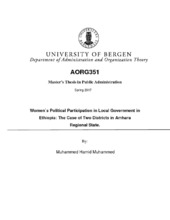| dc.description.abstract | Ethiopian women have been excluded from public sphere for a long period. Their absence, especially from politics, has affected their life enormously. Since political participation increases gender equality and empowerment by promoting women's direct engagement in public decision-making, their participation is very important. Hence, the main objective of this study is, therefore, to explore the political participation of women in two local governments in Amhara regional state in Ethiopia and to analyze the factors that affect their participation. It attempts to explore the level of women`s representation and involvement in the political deliberations and decision-making processes. Recruitment theory, civic engagement models, and critical mass and act theories are used to build the theoretical framework and to conceptualize and operationalize both the dependent and independent variables. The study adopted a qualitative approach that allows incorporating the views of female council members and other stakeholders. The information gathered from the female council members forms the basis of this investigation. The secondary data is also found to be useful. The finding demonstrates that women in both local governments’ councils are adequately represented. However, it also shows that they are less represented in the executive councils and standing committees. It indicates that gender biases and patriarchal views prevailed in the society are still affecting the appointment of women officials for higher positions. It further reveals that elected women influence in the decision-making process in the councils has increased. Consequently, their impacts in the councils and the local governments, in general, have become very significant. Because of the existing political system in the country, system level factors highly influence the political participation of women. Therefore, the electoral system, party system, quota system, and the membership of the political party profoundly affect it. However, the result also indicates the importance of individual attributes for political participation. Finally, it demonstrates that there is no significant variation between the two local governments. The study concludes that though there are things yet to improve, women in the local governments are becoming visible in the political arena. | en_US |
